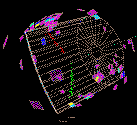 The CBGEANT Mini Guide
The CBGEANT Mini Guide The CBGEANT Mini Guide
The CBGEANT Mini Guidehttp://www-meg.phys.cmu.edu/cb/version.html
Assuming that you do have the most up to date software, then the installation procedure will proceed quite smoothly. First we wish to build the library, and extract any needed files:
cmz -install cbgeant src all
cbgeant_link
At this point, you are ready to run cbgeant.
CMZ /INSTALL=CBGEANT,[.SRC],ALL
@CBGEANT_LINK.COM
At this point, you are ready to run cbgeant.
The program most likely failed to find the jdc gas file. Check to make sure that the file exists where you indicated in the card file.
You probably have an out of date version of geant 321 installed on your machine. You need geant 321 from at least the 94b version of cernlib. One way to check for this is to look for the geant initialization statements in the log file, and make sure that you have correction cradle 03, or later.
This may arise if you do not use the automatic installation procedure. In addition, this may also arise if your machine is not yet supported. Currently, we have support for Alliant, Alpha under both OpenVMS and OSF, Decstation, HP Unix, IBM RISC, Silicon Graphics, SUN, and VAXen under both VMS and OPENVMS. If you are running on some other platform, please report your problems.
Since cbgeant version 5.03/00, we are using FLUKA as the default hadronization package. In order for this to run, the program needs to read in the flukaaf.dat file. Your problem may be that it cannot find the flukaaf.dat file. Check to make sure that this file exists in one of the places in which the program looks.
On decstations, there is a bug in fluka which tries to open this file with write access. In order to work around this problem, you need to have a local copy of flukaaf.dat, and make sure that CERN_ROOT is not defined. The default run script will do this for you.
There seems to be some serious problems with this version of OpenVMS. You should perhaps try to upgrade your fortran compiler to the most recent version. If this fails, you can try compiling the code without optimization. I am unable to trace this probelm, as we are still in the dark ages of OpenVMS version 1.5 at CMU.
You may be generating events using FOWL rather than Hit/Miss weighting. This is steered using the KINE card for the cbgeant Monte Carlo. A normal form for this card is
KINE Event_Generator Event_Weight Event_z_momentum ...
For Event_generator, the usual choice, the event weight can take on two options 0.0 and 1.0 .
0.0 will give you FOWL Monte Carlo wieghts, and 1.0 will give you Hit/Miss weights. If you opt to use the FOWL weightings, you must know that the generated events all have different weights. In using these data, you need to also keep track of these weights. If you use the Hit/Miss option, than all your events will have equal weights -- events generated using the Hit/Miss method will give a flat Dalitz plot. Events generated using FOWL will only give a flat Dalitz plot if you fill the event weights. It will be highly skewed if you forget to do this.
In most cases, you will want to use the Hit/Miss Monte Carlo, and NOT the FOWL generator.
Unfortunately, there appears to be a bug in this release of geant. It is reccommended that you stick with the /03 version, cerlib 95a. You can partially cure this problem by increasing the length of GCBANK from it current 700,000, but this only delays it until later. As far as we can tell, "GEANT321/04 produces some hadronic 'Killer-events' with FLUKA" -- (Marcel Kunze).
 Back to the CMU Crystal Barrel Home Page.
Back to the CMU Crystal Barrel Home Page.
Last updated on the 16'th of April, 1997 by Curtis A. Meyer